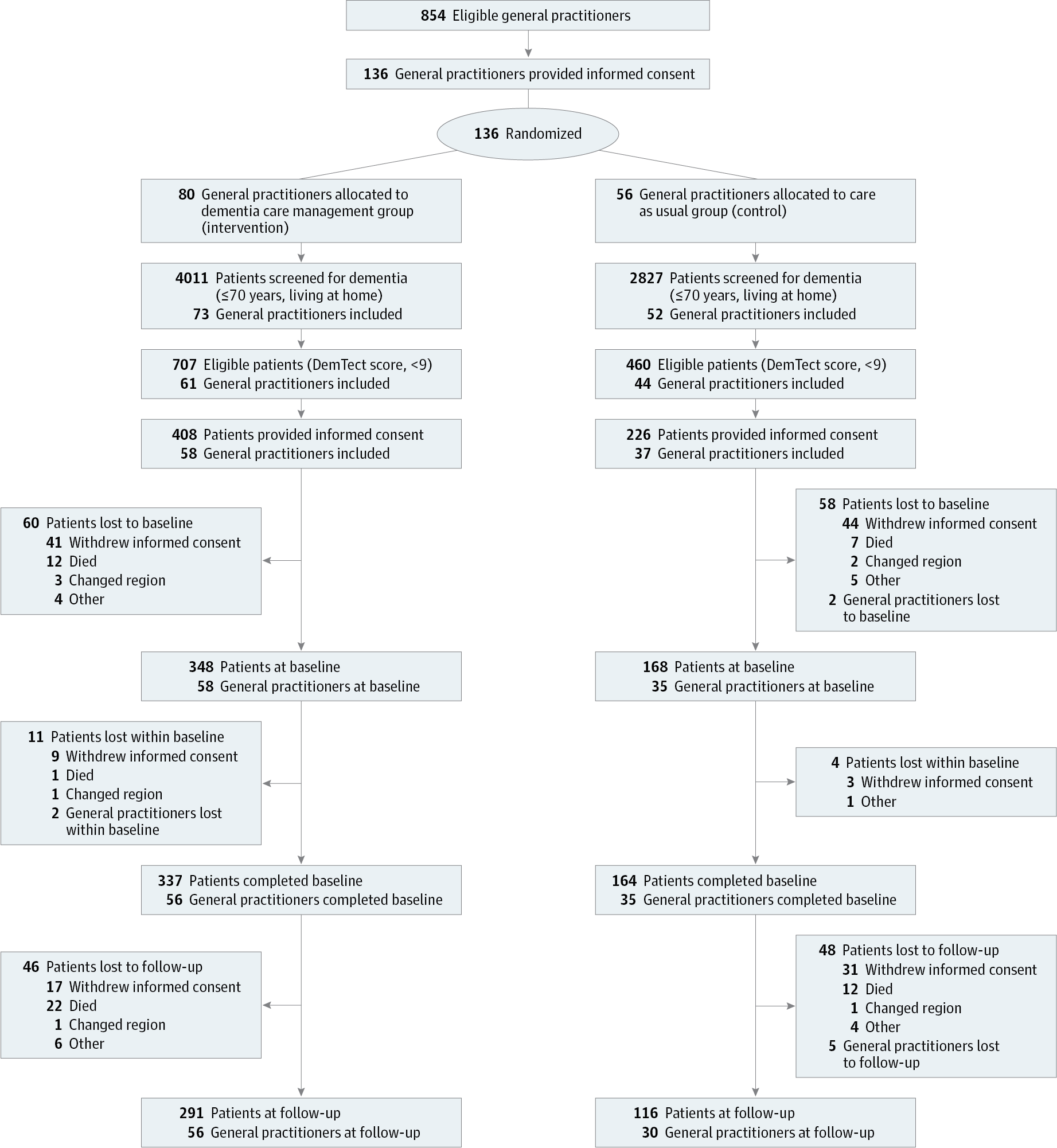JAMA Psychiatry ( IF 22.5 ) Pub Date : 2017-10-01 , DOI: 10.1001/jamapsychiatry.2017.2124 Jochen René Thyrian 1 , Johannes Hertel 2 , Diana Wucherer 1 , Tilly Eichler 1 , Bernhard Michalowsky 1 , Adina Dreier-Wolfgramm 3 , Ina Zwingmann 1 , Ingo Kilimann 4 , Stefan Teipel 5 , Wolfgang Hoffmann 6

|
Importance Dementia care management (DCM) can increase the quality of care for people with dementia. Methodologically rigorous clinical trials on DCM are lacking.
Objective To test the effectiveness and safety of DCM in the treatment and care of people with dementia living at home and caregiver burden (when available).
Design, Setting, and Participants This pragmatic, general practitioner–based, cluster-randomized intervention trial compared the intervention with care as usual at baseline and at 12-month follow-up. Simple 1:1 randomization of general practices in Germany was used. Analyses were intent to treat and per protocol. In total, 6838 patients were screened for dementia (eligibility: 70 years and older and living at home) from January 1, 2012, to March 31, 2016. Overall, 1167 (17.1%) were diagnosed as having dementia, and 634 (9.3%) provided written informed consent to participate.
Interventions Dementia care management was provided for 6 months at the homes of patients with dementia. Dementia care management is a model of collaborative care, defined as a complex intervention aiming to provide optimal treatment and care for patients with dementia and support caregivers using a computer-assisted assessment determining a personalized array of intervention modules and subsequent success monitoring. Dementia care management was targeted at the individual patient level and was conducted by 6 study nurses with dementia care–specific qualifications.
Main Outcomes and Measures Quality of life, caregiver burden, behavioral and psychological symptoms of dementia, pharmacotherapy with antidementia drugs, and use of potentially inappropriate medication.
Results The mean age of 634 patients was 80 years. A total of 407 patients received the intended treatment and were available for primary outcome measurement. Of these patients, 248 (60.9%) were women, and 204 (50.1%) lived alone. Dementia care management significantly decreased behavioral and psychological symptoms of dementia (b = −7.45; 95% CI, −11.08 to −3.81; P < .001) and caregiver burden (b = −0.50; 95% CI, −1.09 to 0.08; P = .045) compared with care as usual. Patients with dementia receiving DCM had an increased chance of receiving antidementia drug treatment (DCM, 114 of 291 [39.2%] vs care as usual, 31 of 116 [26.7%]) after 12 months (odds ratio, 1.97; 95% CI, 0.99 to 3.94; P = .03). Dementia care management significantly increased quality of life (b = 0.08; 95% CI, 0 to 0.17; P = .03) for patients not living alone but did not increase quality of life overall. There was no effect on potentially inappropriate medication (odds ratio, 1.86; 95% CI, 0.62 to 3.62; P = .97).
Conclusions and Relevance Dementia care management provided by specifically trained nurses is an effective collaborative care model that improves relevant patient- and caregiver-related outcomes in dementia. Implementing DCM in different health care systems should become an active area of research.
Trial Registration clinicaltrials.gov Identifier: NCT01401582
中文翻译:

痴呆症护理管理在初级保健中的有效性和安全性随机临床试验
重要性 痴呆症护理管理(DCM)可以提高痴呆症患者的护理质量。缺乏方法学上严格的DCM临床试验。
目的 测试DCM在治疗居家痴呆症患者和照顾者负担(如果有)时的有效性和安全性。
设计,设置和参与者 这项务实的,以全科医生为基础的,集群随机干预试验将基线和12个月随访时的干预措施照常进行了比较。在德国采用简单的1:1常规做法随机分组。分析目的是按照方案进行治疗。从2012年1月1日至2016年3月31日,总共筛查了6838例痴呆症患者(符合条件:70岁及以上并在家中居住)。总体而言,诊断出患有痴呆症的患者为1167名(占17.1%),634例(9.3) %)提供了参加的书面知情同意书。
干预措施在 痴呆症患者的家中进行了为期6个月的痴呆症护理管理。痴呆症护理管理是协作式护理的一种模型,定义为一种复杂的干预措施,旨在通过计算机辅助评估确定个性化的干预模块阵列并随后进行成功监测,从而为痴呆症患者和支持护理人员提供最佳治疗和护理。痴呆症护理管理针对的是个体患者,由具有特定痴呆症护理资格的6名研究护士进行。
主要结果和衡量 指标:生活质量,照顾者的负担,痴呆症的行为和心理症状,抗痴呆药的药物治疗以及可能使用的不适当药物的使用。
结果 634例患者的平均年龄为80岁。共有407位患者接受了预期的治疗,并且可用于主要结局测量。在这些患者中,248名女性(60.9%)是女性,而204名女性(50.1%)独自生活。痴呆症护理管理显着降低了痴呆症的行为和心理症状(b = −7.45; 95%CI,-11.08至−3.81; P <.001)和照顾者负担(b = −0.50; 95%CI,−1.09至0.08; P = .045),与往常一样比较。接受DCM治疗的痴呆患者在12个月后接受抗痴呆药物治疗的机率增加(DCM:291的114 [39.2%]比照常护理的116的31 [26.7%])(赔率,1.97; 95%CI, 0.99至3.94; P = .03)。痴呆症护理管理显着提高 了非独居患者的生活质量(b = 0.08; 95%CI,0至0.17;P = .03),但并未整体提高患者的生活质量。对潜在的不适当用药没有影响(优势比为1.86; 95%CI为0.62至3.62;P = 0.97)。
结论与相关性 由经过专门培训的护士提供的痴呆症护理管理是一种有效的协作护理模型,可改善痴呆症患者和护理人员相关的相关结局。在不同的医疗保健系统中实施DCM应该成为研究的活跃领域。
试验注册 临床试验.gov标识符:NCT01401582











































 京公网安备 11010802027423号
京公网安备 11010802027423号